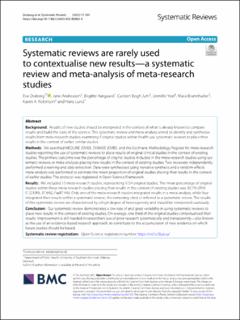Systematic reviews are rarely used to contextualise new results—a systematic review and meta-analysis of meta-research studies
Draborg, Eva; Andreasen, Jane; Nørgaard, Birgitte; Juhl, Carsten Bogh; Yost, Jennifer; Brunnhuber, Klara; Robinson, Karen A.; Lund, Hans Aage
Peer reviewed, Journal article
Published version

Åpne
Permanent lenke
https://hdl.handle.net/11250/3042981Utgivelsesdato
2022Metadata
Vis full innførselSamlinger
- Import fra CRIStin [3621]
- Institutt for helse og funksjon [588]
Sammendrag
Background
Results of new studies should be interpreted in the context of what is already known to compare results and build the state of the science. This systematic review and meta-analysis aimed to identify and synthesise results from meta-research studies examining if original studies within health use systematic reviews to place their results in the context of earlier, similar studies.
Methods
We searched MEDLINE (OVID), EMBASE (OVID), and the Cochrane Methodology Register for meta-research studies reporting the use of systematic reviews to place results of original clinical studies in the context of existing studies. The primary outcome was the percentage of original studies included in the meta-research studies using systematic reviews or meta-analyses placing new results in the context of existing studies. Two reviewers independently performed screening and data extraction. Data were synthesised using narrative synthesis and a random-effects meta-analysis was performed to estimate the mean proportion of original studies placing their results in the context of earlier studies. The protocol was registered in Open Science Framework.
Results
We included 15 meta-research studies, representing 1724 original studies. The mean percentage of original studies within these meta-research studies placing their results in the context of existing studies was 30.7% (95% CI [23.8%, 37.6%], I2=87.4%). Only one of the meta-research studies integrated results in a meta-analysis, while four integrated their results within a systematic review; the remaining cited or referred to a systematic review. The results of this systematic review are characterised by a high degree of heterogeneity and should be interpreted cautiously.
Conclusion
Our systematic review demonstrates a low rate of and great variability in using systematic reviews to place new results in the context of existing studies. On average, one third of the original studies contextualised their results. Improvement is still needed in researchers’ use of prior research systematically and transparently—also known as the use of an evidence-based research approach, to contribute to the accumulation of new evidence on which future studies should be based.
